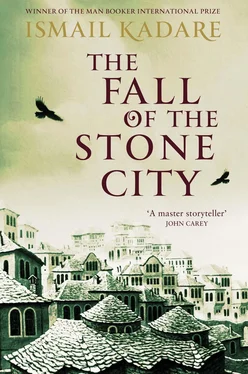They emptied their glasses and the shouts of “Zum Wohl!” mingled with the music of the gramophone as the cocks crew a second time. With soft steps the girl left the drawing room before the exhausted men collapsed on the sofas and on the carpet itself, drifting into a deep sleep.
The girl was woken by the first morning light. For a moment, she could not tell what time it was or why she was lying fully clothed on the bed in her parents’ room.
“Oh God, what have I done!” she said in terror, holding her brow.
The house was silent. Her feet carried her involuntarily to the great drawing room, from which a rasping sound came, like the final struggle of a man who finds it hard to die.
She saw them stretched out where they had fallen, arms outspread and mouths gaping, her father, fiancé and mother, in whose lap an officer had laid his head; and then the colonel, his face still masked, and the others, frozen, white, like sculptures.
She turned towards the gramophone. The needle was stuck, causing the rasping noise. The icy thought ran through her that nobody else could be blamed for the poisoning but herself, the sole person left alive.
After this unforgettable mid-September night the sun rose, for the first time unobserved by anyone in the stone city. Everybody was still asleep, exhausted by the night’s events.
Their waking would become a whole story in itself, to be told in the course of many days and over many cups of coffee. “Where are we?” they asked, as they awoke to find themselves on verandas, in linen cupboards, stretched on the rafters of attics or, as in most cases, on the staircases and in the cellars where sleep had overtaken them. They struggled to work out, if not what time it was, at least the day or the month.
The most difficult question: “What happened?” came last. A thick veil had fallen between them and their memories of events. Behind this veil the story could be discerned dimly, as if it were scared to emerge.
The music of a gramophone was the first thing that seeped through. Then, slowly, and with great effort, people recalled the nightmare of the hostages. The fact that eighty people had lived through the horror of this experience, minute by minute, should have left no room for speculation or error but the hostages did not all tell the same story. Some did not want to admit that they had been hostages, perhaps fearing that in a second wave of arrests they would be told, “You, sir. This is the second time we’ve arrested you.” Other people who had not been hostages were thirsty for fame. They claimed that they had been present facing the machine guns on the city square and were so persuasive that they were believed more readily than genuine hostages.
This confusion added to the general mystery surrounding the events of the day. Out of force of habit these were called “unforgettable”, although so many deserved to be forgotten. They were recalled to mind one by one but more and more tentatively. What about the partisan ambush at the entrance to the city? God knows what really happened there. There were no eyewitness accounts and there was no physical evidence apart from two black skid marks on the asphalt, where it was thought the German motorcycles had turned back.
Probably there really had been an ambush, which the communists called heroic and the nationalists considered a provocation, but it was equally plausible that the whole incident had been invented by the Germans to justify their tactics of terror.
The ambush could be interpreted to the credit of all three parties, but the same could hardly be said of the incident of the white sheet, which was taken as a sign of surrender to the Germans. It was easy to call it a mirage but seen by whom, the inhabitants of the city or the German Army?
Obviously Gurameto’s famous dinner was the biggest mystery of all. It had started as Big Dr Gurameto’s fairy-tale reunion with his German college friend. But the rest went beyond any fairy tale. The invitation to dinner, the gradual release of the hostages, not to mention the climax at dawn in the Gurameto house, the motionless Germans laid out in deathly sleep in the drawing room and the doctor’s daughter, thinking she had poisoned them, and then the Germans slowly stirring, resurrected as if at Easter time, not one Christ but a whole cohort of Christs. This was not just a disgrace to the house but a blasphemous parody.
All these events might have been accepted as imaginary had it not been for one detail: the music of the gramophone. This music had blared all night and everyone had heard it. It might have been taken for a crazy whim on the part of Gurameto, of a kind familiar to the city, where the more respected its citizens were, the more impulsive they were likely to be in their caprices. And yet it was hardly likely that Dr Gurameto would get it into his head on the night of the German invasion to play his gramophone in hermit-like seclusion.
Unable to account for this extraordinary hiatus, people inevitably suggested the influence of some force majeure , like the Double Night. It was as if, after lying in wait for a thousand years, this monster had finally descended to enfold forty or more hours in its arms, seizing a whole day like a wolf snatching a sheep, and had vanished again into the infinite depths of time.
But as people’s heads cleared, so their eyes regained their proper vision. On either side of the iron gates in the city square hung two long flags with the swastika in their centre. Above them was a huge banner in both Albanian and German, appealing for recruits to the newly founded Albanian gendarmerie. A long queue of elderly men had formed by the side entrance before dawn. The German sentries stared in astonishment at their strange gowns and cloaks to which were pinned unheard-of insignia and stripes. These were the old judges of the former empire, who hoped to find employment. From the folds of their robes peered their letters of appointment and copies of their judgments and rulings with their seals and signatures, from all their different postings throughout the boundless Ottoman dominions.
The Albanian interpreter in the ground-floor office found it hard to render into German their records of service, in which the old men placed so many hopes. These described the variety of sentences they had handed down, not just usual ones like beheading and hanging but more sophisticated ones like skinning and dismemberment alive, drowning in vats of boiling water or tepid water in a tank with two snakes. There were other forms of drowning (one involving a monkey) and two ways of being buried alive: one with the legs and part of the trunk under the earth and the head and chest above, and one the other way round. At this point the German officer interrupted the Albanian interpreter with a tactful expression of thanks, adding that Germany had its own forms of punishment and the Third Reich was not a Mongol empire, an expression that struck the old men as “not in very good taste”.
Meanwhile the city’s newspaper Demokratia had reappeared, full of news from the capital. Albania, following its liberation by the Third Reich, had cast off the hated Italian yoke and had been declared a sovereign state. A government had been formed headed not by the famous Mehdi Frashëri, as hoped, but by a respected gentleman named Biçaku. Indeed, a Regency Council had been set up with four members, one for each religious community, evidently in expectation of the return of King Zog I. In even larger type came news of the unification of Kosovo and Çamëria with Albania and a headline announcing the restoration of the ancient Albanian flag: the real standard of Skanderbeg was to be used again, with the black eagle and without the lictor’s fasces, which were a bitter memory of Italy.
Читать дальше












